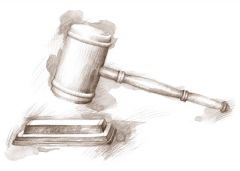![]()
![]()
![]()
Use LEFT and RIGHT arrow keys to navigate between flashcards;
Use UP and DOWN arrow keys to flip the card;
H to show hint;
A reads text to speech;
22 Cards in this Set
- Front
- Back

Every state has to honor court cases legally decided in other states.
|

Full Faith and Credit Clause
|
|
|
Authority of a court to hear only one particular kind of case.
|
Limited Jurisdiction
|
|
|
The authority of a court to hear a wide variety or range of cases.
|
General Jurisdiction
|
|
|
The authority of a court to try a case the first time it is heard.
|
Original Jurisdition
|
|
|
The authority of a court to review a decision of a lower court or administrative agency.
|
Appellate Jurisdiction
|
|
|
The power and authority given to a court to hear a case and to make a judgement.
|
Jurisdiction
|
|
|
Cases between citizens of different states where the amount of money exceeds $75,000.
|
Diversity of Citizenship
|
|
|
When a case can be filed in Federal or a state court.
|
Dual Jurisdiction
|
|
|
The process of deciding which court is best for a plaintiffs case.
|
Forum Shopping
|
|
|
A case that is based on admiralty, patents, copyrights or bankruptcy.
|
Exclusive Jurisdiction
|
|
|
Federal protection for an invention or design, giving the inventor exclusive ownership rights for a period of time
|
Patent
|
|
|
Federal protection that gives authors or originators of written or artistic productions (music, plays, etc.) the right to publish, print, or sell it for a period of time.
|
Copyright
|
|
|
Another name for Appellate courts.
|
Intermediate Courts
|
|
|
The current Chief Justice of the United States Supreme Court.
|
John Roberts
|
|
|
The Federal court system gets it's authority from ...
|
1. The United States Constitution
2. Federal laws |
|
|
State courts get their authority from ...
|
1. Their state constitutions
2. State laws |
|
|
State courts almost always have the power to hear cases involving events that....
|
1. Events that took place in that state.
2. If the defendants live in or are served with a summons and complaint in that state. |
|
|
(T/F) Most lawsuits that can be filed in federal district court can also be filed in state court.
|
True
|
|
|
Federal district courts have this type of jurisdiction.
|
Original Jurisdiction
|
|
|
Appellate courts have this type of jurisdiction.
|
Appellate Jurisdiction
|
|
|
Supreme courts (both Federal and state) have this type of jurisdiction.
|
Both Original and Appellate Jurisdiction
|
|
|
Every state has to honor court cases legally decided in other states.
|
Full Faith and Credit Clause
|

